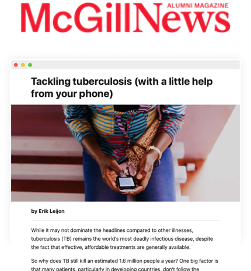Publications
The New England Journal of Medicine, “Digital Health Support in Treatment for Tuberculosis”
“These features further enhanced accountability, helped to establish a norm of adherence, and emphasized the benefits of adherence in the community — all of which motivated patients to cooperate.”
Informs’ Manufacturing & Service Operations Management, “Improving Tuberculosis Treatment Adherence Support: The Case for Targeted Behavioral Interventions”
“We find that, on average, sponsor outreach to patients increases the odds ratio of next-day treatment adherence verification by 35%. Furthermore, patients’ prior verification behavior can be used to accurately predict short-term (treatment adherence verification) and long-term (successful treatment completion) outcomes. These results allow the provider to target and implement behavioral interventions to at-risk patients.”
The New York Times, “How to Get TB Patients to Take Their Pills? Persistent Texting and a ‘Winners Circle’”
“The hardest part of curing tuberculosis, doctors say, is getting patients to take all their pills every day for at least six months.
Health officials have tried many ways to persuade patients to comply, from gentle encouragement to imprisonment in locked wards. Now researchers have come up with a new tactic: A program based on nagging cellphone texts succeeded in goading patients into taking their drugs in a preliminary test in Nairobi, Kenya.”
USAID’s Center for Innovation and Impact, “2020 Global Health Innovation Index”
“Patients enrolled in Keheala’s support program had 68% fewer unsuccessful health outcomes - death, failed treatment and loss to follow up - than the standard of care control group. The intervention demonstrated very high levels of patient and health worker acceptability. Keheala is a good fit for any TB, HIV, or NCD program that is seeking to improve treatment adherence.”
The World Economic Forum, “This app for tuberculosis increases odds of patients completing treatment”
“The researchers, working with Keheala, developed a health platform for the tuberculosis patients that works on “feature phones,” which are generally limited to talk and texting functionality, and are relatively common in Kenya in areas more prone to contagious disease outbreaks.”
MIT News, “A Tech Intervention to Tame Tuberculosis”
“This is a space where behavioral science can play a major role in improving health outcomes. To me, what is so exciting about this paper is that we show how an intervention which is technologically quite simple has a really large positive impact because it is designed in a psychologically sophisticated way.”
ICT Works, “Improving Tuberculosis Care with Behavior Change Technology”
“Keheala is only adherence solution that has rigorously demonstrated improved health outcomes in tuberculosis without requiring directly ...”
NoCamels, “Israeli Health Startup Taps Into Behavioral Science—And Texting— To Help Combat Tuberculosis”
“Keheala developed a 'low-tech' solution to help motivate treatment adherence and get patients to take their medications on time.”
McGill News, “Tackling tuberculosis (with a little help from your phone)”
“While it may not dominate the headlines compared to other illnesses, tuberculosis (TB) remains the world’s most deadly infectious disease, despite the fact that effective, affordable treatments are generally available.
So why does TB still kill an estimated 1.6 million people a year? One big factor is that many patients, particularly in developing countries, don't follow the treatment regimen properly. Keheala, a digital health platform founded by Jon Rathauser, BSc'13, was created to tackle the behavioural aspects that allow the disease to flourish.”
Borgen Magazine, “Keheala: Tackling TB in Kenya Through Tech”
“Health systems often lack the resources or expertise to address these challenges,” Rathauser told The Borgen Project. “Keheala bridges this gap by extending the reach of the health care system directly to the patient.”
STAT News, “The resurgence of tuberculosis is behavioral, not medical. Nudges can fix it”
“The cause of TB’s resurgence is not medical; a highly effective though burdensome treatment has existed for the disease since the mid-1940s. Instead, the cause is mostly behavioral: Faced with the prospect of extended treatment and isolating stigma, many people are slow to seek treatment or quit partway through. This fuels the tuberculosis epidemic by giving the disease ample opportunities to spread and mutate into drug-resistant strains like the one that infected Nancy.
If the fuel is behavioral, then the solution should be as well.”












